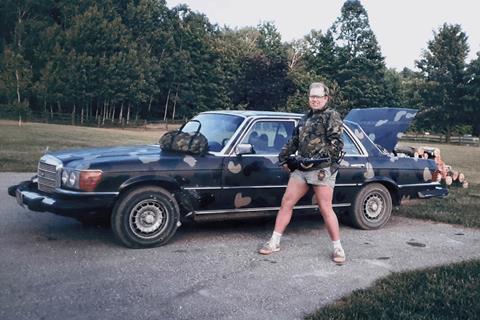Ramin Bahrani takes a fascinating, surprising look at US body armour company Second Chance

Dir/scr: Ramin Bahrani. USA. 2022. 89mins
Making a great documentary is half finding the right story, half knowing what to do with it. Ramin Bahrani hits the jackpot on both counts in this slyly entertaining but also morally and emotionally resonant investigation of the rise and fall of US body armour company Second Chance and its attention-seeking founder, Richard Davis. Given cinematic sheen by T. Griffin’s sensitive score and the tasty theatrical staging of its interview scenes, this is a feature that should reach beyond the obvious streaming berths to connect with global audiences, and perhaps generate some awards heat in the process.
It soon becomes clear that the director is not out to do a hatchet job
Davis is a man who shot himself in the chest 192 times – in order to demonstrate to law enforcement agencies all over the States the efficacy of the bulletproof vests made by the company he founded in the early seventies; a company bankrupted by lawsuits in 2005 after it was revealed that it had knowingly sold or failed to recall defective vests. Many of these sales-pitch self-shootings were video-taped, but Davis’ own directing career didn’t end there. He also created a series of bizarre promotional movies with names like Second Chance vs Magnum Force that mixed badly acted skits lampooning anti-gun liberals, vignettes in which police officers saved while wearing Second Chance vests re-enacted those shoot-outs, and lots of scenes of Davis himself just basically shooting shit up.
This often demented VHS footage is clearly pure gold for a ‘takedown’ documentary, and indeed, it’s not only the Michigan setting that initially has us thinking of Michael Moore, given the promised mix of toxic gun culture, corporate misdemeanour and Bahrani’s track record as a director who, in features from Man Push Cart to 99 Homes, has long sided with the dispossessed underclass of America. But as 2nd Chance turns into a nuanced, shape-shifting, partly meta-cinematic morality tale, we start to make comparisons with the work of another documentary filmmaker, Joshua Oppenheimer. And lo and behold, there he is, listed as executive producer in the final credits.
Bahrani breaks this contemporary morality tale down into an introduction, six named chapters and an ‘epilogue’. He does so through interviews with Davis, his two former wives and those connected, closely or tangentially, with his glory days and fall from grace, filling in gaps in the story with his own, rather earnest voice-over narration. At times, we get the sense that the larger-than-life subject, described by his second wife as an ‘operatic character’, is playing with this heart-on-sleeve liberal director – as when he breaks into a modified Trumpian version of Woodie Guthrie’s socialist anthem This Land is Your Land, repeating the line “This land is my land” over and over.
But it soon becomes clear that the director is not out to do a hatchet job. He’s clearly fascinated by the self-made Michigan businessman, whose body armour corporation created hundreds of jobs in the small north Michigan town of Central Lake, and whose vests undeniably saved hundreds of police lives: Davis charted them all as numbered ‘Saves’ in promotional materials. At the same time, this is a guy with some crazy ideas; we humans must be natural predators because both our eyes face forward. He also tried to bribe and then threaten a Central Lake teenager to take the rap for an incident during which a stray bullet entered a local woman’s home during an annual Second Chance shooting festival, and who sent guns to his ‘Saves’ as gifts – but only if they had actually killed their attackers.
Back and forth goes the moral pendulum, enriched from the mid-point on by revelations about Davis’s relationship with his own tough cookie of a father and by the growing presence in the storyline of Aaron Westrick, a former police officer who was Second Chance’s Save No. 265 and ended up working for the firm. But it’s a bait and switch at the end of the film that is its most impressive and emotionally devastating touch, as we come to realise that maybe this isn’t about a guy who set up a body armour company at all – maybe it’s about what makes us human.
Production companies: Vespucci, Endeavour Content, Samuel Marshall Films
International sales: WME Independent
Producers: Daniel Turcan, Johnny Galvin, Charles Dorfman, Ramin Bahrani, Jacob Grodnik
Editing: Aaron Wickenden
Cinematography: Adam Stone
Music: T. Griffin






![The Brightest SunScreen[Courtesy HKIFF]](https://d1nslcd7m2225b.cloudfront.net/Pictures/274x183/3/5/0/1448350_thebrightestsunscreencourtesyhkiff_312678.jpg)















![The Brightest SunScreen[Courtesy HKIFF]](https://d1nslcd7m2225b.cloudfront.net/Pictures/100x67/3/5/0/1448350_thebrightestsunscreencourtesyhkiff_312678.jpg)

